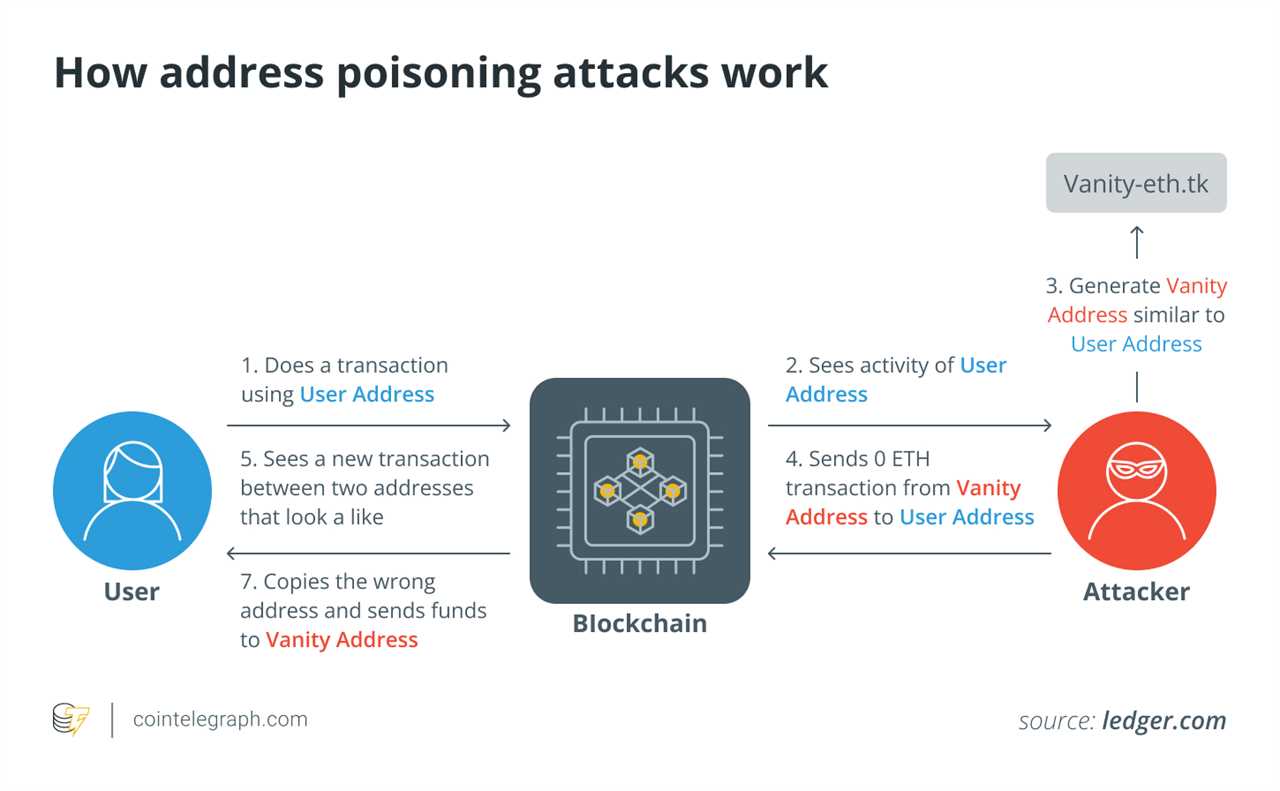
Address poisoning attacks are a serious threat to the integrity of data and network security. These malicious tactics are used by attackers to reroute traffic, interrupt services, or gain unauthorized access to sensitive information. In the crypto space, these attacks are primarily aimed at either illegally acquiring digital assets or disrupting the smooth operation of blockchain networks. Address poisoning attacks can take various forms, including theft, disruption, and deception.
Theft: Tricking Users and Diverting Funds
One common type of address poisoning attack is theft. Attackers employ strategies such as phishing, transaction interception, or address manipulation to trick users into transmitting their funds to malicious addresses. They may create phony websites or communications that resemble reputable companies like cryptocurrency exchanges or wallet providers. Once users disclose their login information, private keys, or recovery phrases, attackers can carry out unlawful transactions and gain unauthorized access to victims' digital assets.
Disruption: Congestion, Delays, and Smart Contract Issues
Address poisoning can also be used to disrupt the normal operations of blockchain networks. Attackers introduce congestion, delays, or interruptions in transactions and smart contracts, thereby reducing the effectiveness of the network. These disruptions can lead to unforeseen consequences that affect the entire ecosystem of the blockchain network.
Deception: Posing as Well-Known Figures
Attackers frequently attempt to mislead cryptocurrency users by posing as well-known figures. This undermines community trust in the network and can result in erroneous transactions or confusion among users. It is essential for users to exercise caution and verify the authenticity of any communication they receive, especially when dealing with financial transactions.

Types of Address Poisoning Attacks
Address poisoning attacks in the crypto space encompass various techniques. These include phishing attacks, transaction interception, address reuse exploitation, Sybil attacks, fake QR codes, address spoofing, and smart contract vulnerabilities. Each type of attack poses unique risks to users' assets and network integrity.
Consequences of Address Poisoning Attacks
Address poisoning attacks can have devastating effects on both individual users and the stability of blockchain networks. Attackers can steal crypto holdings or alter transactions to reroute money to their own wallets, resulting in significant financial losses for their victims. Moreover, these attacks erode users' trust in the security and dependability of blockchain networks. Attacks like Sybil attacks or the abuse of smart contract flaws can also disrupt the normal functioning of blockchain networks, causing delays, congestion, or unforeseen consequences.
Protecting Against Address Poisoning Attacks
To protect digital assets and maintain the security of blockchain networks, it is crucial to implement preventive measures against address poisoning attacks. Here are some ways to reduce the risk:
- Use fresh addresses: Creating new wallet addresses for each transaction reduces the predictability of addresses and decreases the chances of being targeted by attackers.
- Utilize hardware wallets: Hardware wallets provide enhanced security by keeping private keys offline, minimizing exposure to potential attacks.
- Exercise caution when disclosing public addresses: Avoid sharing crypto addresses on public platforms, especially social media sites, and consider using pseudonyms to maintain privacy.
- Choose reputable wallets: Select well-known wallet providers that offer robust security features and regular software updates.
- Regularly update wallet software: Consistently updating wallet software helps protect against address poisoning attacks by ensuring that security measures are up to date.
Protecting digital assets and maintaining the integrity of blockchain networks require vigilance and adherence to strict security procedures in the cryptocurrency ecosystem. By understanding address poisoning attacks and implementing preventive measures, users can safeguard their assets and contribute to a safer crypto space.
Did you miss our previous article...
https://trendinginthenews.com/crypto-currency/polkadot-community-polkaworld-halts-operations-amid-funding-rejection






